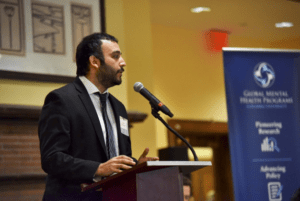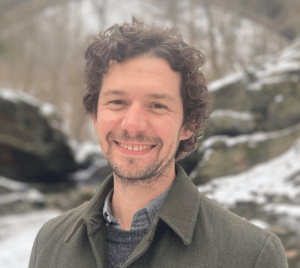Upcoming Symposiums
There are no upcoming symposiums as of yet. Please check back in soon!
Past Symposiums
“Social Regulation of Human Gene Expression”
 |
Dr. Steven ColeDate/Time: March 27, 2024 from 12:00-1:00pm EST |
Description: Research in human social genomics has mapped several molecular pathways by which social, psychological, economic, cultural, and other environmental processes regulate the function of the human genome and thereby influence health, physiology, and development. These studies have also yielded some unexpected insights into the molecular basis of thriving and resilience, suggesting a new perspective on the nature of “the good life” and the evolutionary basis for neural regulation of the human genome.
About the speaker: Steven Cole is a Professor of Psychiatry & Biobehavioral Sciences and Medicine in the Division of Hematology-Oncology at the David Geffen School of Medicine at UCLA. His research utilizes molecular genetics and computational bioinformatics to analyze the pathways by which social and environmental factors influence the activity of the human genome, as well as viral and cancer genomes. He pioneered the field of human social genomics, and discovered the “Conserved Transcriptional Response to Adversity” that mediates health disparities via neural regulation of inflammatory and antiviral genes. He collaborates with more than 200 research groups world-wide through his role as Director of the UCLA Social Genomics Core Laboratory, and is a member of the Jonsson Comprehensive Cancer Center, Associate Director of the Norman Cousins Center, and a Fellow of the American Association for the Advancement of Science.
“A Decolonial Approach for Global Mental Health Research and Practice”
 |
Dr. Franco MascayanoDate/Time: October 11, 2023 from 12:00-1:00pm EST |
Description: Major global agencies have called for the implementation and scaling up of mental health interventions in the Global South. However, the field still grapples with its historical ties to postcolonialism and the dominance of a predominantly European-centric agenda. Despite substantial efforts to bridge the mental health gap in the Global South, some solutions may have inadvertently had iatrogenic effects, exacerbating the already enormous inequities between the Global North and the Global South, rather than fostering sustainable changes that resonate with and acknowledge local needs and resources. Drawing from the speaker’s global and regional experiences, this presentation highlights actions that either promote or hinder the decolonization of global mental health.
About the speaker: Franco is Director of Employment Research at the IPS Employment Research and Training Center at NYSPI/Columbia Psychiatry. Franco is a Chilean psychologist (Universidad de Valparaiso) and psychiatric epidemiologist (Columbia Mailman School of Public Health) whose research focuses on understanding social and contextual determinants of mental health and developing and evaluating evidence-based practices for people with psychiatric disabilities. He has played major roles in evaluating programs such as OnTrack New York, Critical Time Intervention, and Assertive Community Treatment in the U.S. and Latin America. He is also one of the creators the Chilean Psychiatric Registry, the first linked electronic psychiatric registry in Latin America, which is being used to study the causal effects of social determinants, such as employment and education, on the onset and course of early psychosis.
“Family Psychoeducation for Schizophrenia in Tanzania: Improving outcomes via social support and hopefulness”
 |
Dr. Joy Noel BaumgartnerDate/Time: April 19, 2023 from 10:00-11:00am EST
|
Description: Family psychoeducation (FPE) is an evidence-based practice from high-income countries to help individuals with psychotic disorders and their relatives cope more effectively with illness. FPE has never been tested in a low-resource setting such as Tanzania where family involvement for illness management is fundamental. This presentation will share results from a pilot clinical trial of a culturally tailored family psychoeducation model (“KUPAA”) for adults with psychotic disorders and their relatives. KUPAA was designed to be appropriate for settings where participants might have both traditional and biomedical ideas about mental illness and sustainability by including relatives as group co-facilitators. Pilot clinical trial objectives were to test impact on functioning, quality of life and relapse among an outpatient treatment-engaged population with schizophrenia. This presentation will highlight our main outcomes, cultural adaptation process, insights on the mechanisms of action for FPE (social support, hopefulness, stigma), and next steps for testing at a national scale.
About the speaker: Dr. Baumgartner is an Associate Professor in the School of Social Work (SSW) at the University of North Carolina in Chapel Hill with an adjunct appointment in the Gillings School of Public Health. As Director of the School of Social Work’s Global Mental Health Initiative, Dr. Baumgartner’s mixed methods research is grounded in the fields of psychiatric epidemiology, implementation science, and integrated service systems to inform, co-create, and evaluate novel global health interventions. She is a current PI or investigator on several NIH-funded grants and has published 80+ journal articles and pieces of engaged scholarship in global public health and social welfare. Her areas of expertise include strengthening the delivery of integrated health and social service interventions that address mental health, HIV prevention, reproductive health, maternal, child & adolescent health, and/or gender-based violence, largely in Eastern and Southern African countries.
“Exploring the importance of stigma in interventions among children and adolescents in populations affected by displacement”
 |
Dr. Sabrina HermosillaDate/Time: March 8, 2023 from 10:00-11:00am EST |
Description: Seeking to understand stigma is important when designing, implementing, and disseminating findings related to interventions that seek to improve the mental health and psychosocial wellbeing of children and adolescents, especially when addressing both the proximal risks and larger structural factors that influence mental health and psychosocial wellbeing. This talk will use examples from recent projects in Nepal, Uganda, and Jordan to walk through ways study and implementation teams explicitly deal with stigma and explore ways / open discussion on other ways that the work could be improved.
About the speaker: Dr. Sabrina Hermosilla is an Assistant Professor in the Heilbrunn Department of Population and Family Health at the Columbia University Mailman School of Public Health. She completed her PhD, MIA and MPH at Columbia University, holds an MS from The City College of New York, and a BA from Colgate University. Dr. Hermosilla has almost two decades of experience designing and conducting applied research studies. She applies epidemiologic principles and methods to study social determinants of mental health and psychosocial outcomes in complex global settings. With an explicit focus on potentially modifiable factors, her research in implementation science explores and builds the evidence around commonly implemented interventions, primarily in humanitarian and forced migration settings. Her teaching centers on the epidemiology of global and adolescent mental health, and applied data collection and management best practices.
“Reaching Children in Context: Family- and Community-based Intervention Approaches”
 |
Dr. Eve PufferDate/Time: December 14, 2022 from 10:00-11:00am EST
|
Description: The mental health treatment gap is large worldwide, especially for children and adolescents. There is a scarcity of mental health specialists with expertise in care for young people, and risk factors at the individual, family, and community levels require integrated responses that are difficult in low-resource contexts. In this presentation, Dr. Puffer will describe a community-embedded approach to delivering interventions for children and families, as illustrated in the development and delivery of a package of family-based programs in Kenya. She will discuss the development of the family strengthening and family therapy interventions designed for low-resource settings, as well as the implementation by non-specialist, community-based providers.
About the speaker: Dr. Puffer is an Assistant Professor in Psychology and Neuroscience and Global Health at Duke University and is a licensed clinical psychologist. Her research focuses on developing and evaluating family- and community-based interventions to address child and adolescent mental health needs in low-resource settings. Current research studies include evaluations of parenting programs, family strengthening and family therapy interventions, and community-based mental health and HIV prevention efforts in religious congregations. Dr. Puffer is an investigator on trials in Kenya, Liberia, Thailand, Ethiopia, and El Salvador. She also conducts studies to validate measures of family well-being and mental health for low- and middle-income country settings
“Do Young People Experience a ‘Package Deal’ of Consequences when they Self-Label with a Mental Health Problem?”
 |
Dr. Bruce LinkDate/Time: November 16, 2022 from 10:00-11:00am EST |
Description: What should a person do when mental health symptoms arise? Strong public mental health messaging tells us that it is good to self-label symptoms and to seek appropriate treatment for them. A failure to do so reflects a lack of “mental health literacy.” In contexts where people with serious mental illnesses are cared for clinicians identify a disinclination to self-label as a lack of “insight” and bemoan the negative consequences it has for adherence to treatment protocols. Concepts from stigma research see an avoidance of self-labeling less as illiteracy or a lack of insight and more as a self-protective stigma resistance strategy. Avoiding a self-label protects against the application of negative stereotypes associated with mental illnesses. What then are the consequences of self-labeling? We examine the effects of mental illness self-labels on a crucial component of psychological well-being for persons with mental health problems–self-esteem–by using longitudinal data that followed 427 sixth-grade youth over two years. While controlling for symptom severity and other factors we find that as youth move in and out of self-labeling over the two-year period their self-esteem is affected — those adopting a self-label experience a decline in self-esteem while those shedding a self-label they once endorsed experience a boost in self-esteem. Our results suggest there is an understandable reason why people might avoid self-labeling and that simply chalking it up to illiteracy or a lack of insight might be doing more harm than good.
About the speaker: Dr. Bruce Link is Distinguished Professor of Public Policy and Sociology at the University of California Riverside and Professor Emeritus of Epidemiology and Sociomedical Sciences at the Mailman School of Public Health of Columbia University. Dr. Link received his Ph.D. in Sociology (1980) and a Masters in Biostatistics (1982) from Columbia University. He received the Leonard Pearlin Award for career achievement from the Mental Health Section of the American Sociological Association in 2002. In 2007 he received the Leo G. Reeder Award from the Medical Sociology Section of the American Sociological Association and the Rema Lapouse Award from the Mental Health Section of the American Public Health Association. He was elected to the US National Academy of Medicine in 2002. Dr. Link’s interests are centered on topics in psychiatric and social epidemiology as they bear on policy issues. He has written on the connection between socioeconomic status and health, homelessness, violence, stigma, and discrimination. With Jo Phelan, he has advanced the theory of social conditions as fundamental causes of disease. Currently he is conducting research on the life course origins of health inequalities by race/ethnicity and socioeconomic status, the consequences of social stigma for the life chances of people who are subject to stigma, and on evaluating intervention efforts aimed at reducing mental illness stigma in children attending middle school.
“Cognition, Schizophrenia and Clinical Outcomes“
 |
Dr. William StoneDate/Time: September 21, 2022 from 10:00-11:00am EST
|
Description: Cognitive abnormalities have long been accepted as core features of schizophrenia in all stages of illness. Despite its ubiquity, however, its roles in the development and persistence of the disorder remain unclear. Recent research in our and other laboratories confirm only modest associations with clinical outcomes for several prominent cognitive abnormalities involving attention / working memory, executive functions (e.g., learning, problem solving, processing speed) and performances on tests of declarative memory, but stronger relationships with functional outcomes. This presentation will highlight our current state of knowledge about cognition in schizophrenia at different stages of illness and present data that may help us reduce the knowledge gap between cognition as a biomarker of future clinical outcomes and cognition as an indicator of current functional capacity.
About the speaker: Dr. Stone is an Associate Professor of Psychology in the Harvard Medical School Department of Psychiatry at the Beth Israel Deaconess Medical Center (BIDMC) and the Massachusetts Mental Health Center (MMHC). He is the Director of the Psychosis Research Program at BIDMC and MMHC, and the Director of the Fellowship in Clinical Neuropsychology at BIDMC and MMHC. He has worked for over 25 years to identify mechanisms underlying the development of psychosis in adolescents and young adults, with a focus on cognition. Dr. Stone is a current PI or investigator on several NIMH-funded grants, has published over 215 journal articles and book chapters, and co-edited 2 books. He is a Past President of the Massachusetts Neuropsychological Society and is the current Secretary of the American Psychopathological Association.
“Employability and Wellbeing of Low-Wage Health Care Workers: A Case of Medical Assistants”
 |
Dr. Alden LaiDate/Time: April 20, 2022 from 10:00-11:00am EST
|
Description: Many low-wage health care workers (e.g., home health aides, nursing assistants) are employed in jobs that have low job security and minimal resources to grow professionally. Already a vulnerable group of workers, they are also often at the periphery as organizations are likely to treat them as “replaceable” instead of engaging in efforts to develop and retain them. Consequentially, the work environments of low-wage health care workers may be impinging on their wellbeing in different ways compared to other workers. Using the case of medical assistants – whose median hourly wage in 2020 was $17.23 per hour – I will discuss findings from an ongoing study that examines what they value at work and how managers can better create employer-employee relationships that are mutually beneficial and therefore sustained.
About the speaker: Alden Lai is a health care management scholar who studies how to improve the jobs and work environments of health care workers. His current research focuses on proactivity at work, including job crafting and the conditions under which workers and managers can shape jobs to improve work engagement, generate meaningfulness, or reduce burnout. Dr. Lai’s research has appeared in both management and health care journals, including Academy of Management Discoveries, Health Care Management Review, Medical Care Research and Review, and The Milbank Quarterly. He also serves as Executive Advisor to the Global Wellbeing Initiative, a collaboration between Gallup Inc. and the Wellbeing for Planet Earth Foundation that collaborates with philanthropies, corporations, and international organizations to foster a more globally inclusive understanding of wellbeing for research, practice, and policy.
“Mental Health Policy Dissemination and Implementation Research“
 |
Jonathan Purtle, DrPH, MScDate/Time: March 23rd, 2022 from 10:00-11:00am EST |
Description: This presentation will provide an overview of research in the area of mental health policy dissemination and implementation research. Drawing from empirical research conducted in the United States by Dr. Purtle and his colleague, the presentation will highlight examples of methods and research questions in the area.
About the speaker: Dr. Purtle is an Associate Professor in Department of Public Health Policy & Management and Director of Policy Research of the Global Center for Implementation Science at the New YorkUniversity School of Global Public Health. He is an implementation scientist whose research focuses on mental health policy. His work examines questions such as: how research evidence can be most effectively communicated to policymakers and how it is used in policymaking processes, how social and political contexts affect policymaking and policy implementation, and how the implementation of policies “on the books” can be improved in practice. He is also interested in population-based approaches to mental health and how mental health can be integrated in to mainstream public health practice. Dr. Purtle’s work has been consistently funded by the National Institute of Mental Health (NIMH) and Robert Wood Johnson Foundation (RWJF). He is currently leading NIMH-funded projects focused on the implementation of policies that earmark taxes for mental health services and understanding the dynamics of research evidence in mental health policymaking and a RWJF-funded project that experimentally tests different ways of communicating evidence about child maltreatment to the public and policymakers.
“Treating depression and improving adherence in HIV care with task-shared cognitive behavioural therapy in Khayelitsha, South Africa: a randomized controlled trial (Ziphamandla)”
 |
Lena S. Andersen, PhDDate: February 23rd, 2022 |
Description: Major depressive disorder, highly prevalent among people with HIV (PWH) globally, including South Africa is associated with suboptimal adherence to antiretroviral therapy. Globally, there are insufficient numbers of mental health providers and tested depression treatments. Dr. Andersen will present on the outcomes of a two-arm randomized controlled effectiveness trial of a task-shared cognitive-behavioral therapy treatment for adherence and depression (CBT-AD) in people with HIV in South Africa.
About the speaker: Dr. Lena S. Andersen is a clinical psychologist who recently joined the Global Health Section in the Department of Public Health at the University of Copenhagen. Dr. Andersen was previously a Senior Research Officer in the HIV Mental Health Research Unit in the Department of Psychiatry and Mental Health at the University of Cape Town. Her research to date has focused on culturally adapting evidence-based psychological treatments for common mental disorders in people with HIV in South Africa. Her clinical and research interests are in developing and scaling evidence-based psychosocial interventions for comorbid mental disorders and chronic illness in resource-constrained settings globally.
“Mind the Gap: Using Dissemination and Implementation Science to Improve Mental Health in Low-Resource Settings”
 |
PhuongThao D. Le, PhD, MPHDate/Time: January 19th, 2022 |
Description: Dr. Le will highlight the rationale and methods of several global mental health implementation science projects, including an R01 study to validate a measure to assess barriers and facilitators of implementing task-sharing mental health interventions in low- and middle-income countries, and her recently awarded K01 study to adapt and pilot the World Health Organization stress management program, Self Help Plus, among Vietnamese breast cancer patients.
About the speaker: PhuongThao D. Le, PhD, MPH is an Assistant Research Scientist at NYU School of Global Public Health and Senior Advisor for Monitoring, Evaluation, Accountability, Research, and Learning at HealthRight International. Dr. Le’s research focuses on innovative, culturally appropriate, and community-based approaches to alleviate the mental health burden among vulnerable and marginalized populations, including survivors of human trafficking, racial/ethnic minorities, and cancer patients and survivors. She earned a B.S. in applied mathematics from University of California at Los Angeles (UCLA), a Master of Public Health from Columbia University School of Public Health, and a PhD in Public Health at UCLA School of Public Health. Dr. Le also completed postdoctoral fellowships at NYU School of Global Public Health and Johns Hopkins University School of Public Health.
“Development, evaluation and scaling up a collaborative care model for integrated depression care in South Africa”
 |
Arvin Bhana, PhDDate/Time: November 17th, 2021 |
Description: South Africa has a 12-month prevalence estimate of 16.5% for common mental disorders (CMD), with almost a third (30,3%) of the population having experienced a CMD in their lifetime. The treatment gap is high with only one in four people with a CMD receiving treatment. This presentation will highlight the characteristics of the development, implementation, and evaluation of a collaborative care model that seeks to address this treatment gap in relation to common mental disorders into existing service delivery platforms at a primary health care level customized to local conditions at a district level. Dr. Bhana’s presentation will focus on addressing challenges and solutions along the cascade of care and highlights population effects using the RE-AIM (Reach, Effectiveness, Adoption, Implementation, Maintenance) evaluation framework and the CIFR (Consolidated Framework for Implementation Research) to understand contextual determinants of implementation success. This presentation will underline the importance of learning health systems in the effort to scale up integrated depression care.
About the speaker: Arvin Bhana, PhD is an Honorary Associate Professor at the Centre for Rural Health in the School of Nursing and Public Health at the University of KwaZulu-Natal and an Honorary Research Associate in the Health Systems Research Unit at the South African Medical Research Council. Dr Bhana’s research focuses on integrating mental health into primary care and child and adolescent mental health and well-being.
“Global Mental Health & Stigma Program Faculty Presentations”
Date/Time: October 20th, 2021
Description: The mission of the Global Mental Health & Stigma Program is to demonstrate the importance of mental health as integral to public health and improve global mental health through research, training, and implementation. At this virtual event, program collaborators will present research and findings on mental health topics.
 |
Emily Goldmann, PhD, MPHEmily Goldmann, PhD, MPH is a Clinical Associate Professor in the Department of Epidemiology at NYU College of Global Public Health. Dr Goldmann’s research focuses on the social determinants of common mental disorders, substance use, behavioral health surveillance, and physical-mental health comorbidity. |
 |
Brian J. Hall, PhDBrian J. Hall, PhD is a Professor of Global Public Health at NYU Shanghai, an Associated Professor at the School of Global Public Health, NYU, and Associated Professor in the Department of Health, Behavior, and Society at the Johns Hopkins Bloomberg School of Public Health. Dr. Hall is leading digital mental health implementation science trials, conducting studies on the consequences of disasters and other traumatic events in China, and addressing the health and mental health of diverse populations, including migrant worker groups in the Asia-Pacific region. |
 |
PhuongThao D. Le, PhD, MPHPhuongThao D. Le, PhD, MPH is an Assistant Research Scientist at NYU School of Global Public Health and Manager for Monitoring, Evaluation, Accountability, Research, and Learning at HealthRight International. Dr. Le’s research focuses on innovative, culturally appropriate, and community-based approaches to alleviate the mental health burden among vulnerable and marginalized populations, including survivors of human trafficking, racial/ethnic minorities, and cancer patients and survivors. |
 |
Peter Navario, PhD, MPHPeter Navario, PhD, MPH is a Clinical Assistant Professor of Public Health Policy and Management at NYU School of Global Public Health, as well as the Executive Director at HealthRight International. Dr. Navario has extensive field experience establishing, monitoring, and evaluating HIV/AIDS treatment programs and health system capacity building across more than 15 countries in sub-Saharan Africa. |
 |
Nawarj Upadhaya, PhD, MScNawarj Upadhaya, PhD, MSc is the Director of the Peter C. Alderman Program For Global Mental Health at HealthRight International. Dr. Upadhaya has extensive experience in NGO management, program development and intervention design in public health and mental health, and research and policy level advocacy in low- and middle-income countries. |
 |
Lawrence Yang, PhDLawrence Yang, PhD is an Associate Professor and Vice Chair of the Department of Social and Behavioral Sciences at NYU School of Global Public Health, where he directs the Global Mental Health and Stigma Program and is Associate Director of the Global Center for Implementation Science. Dr. Yang’s research focuses on global mental health and implementation science, as well as stigma of various health conditions with a focus on psychosis. |
“A Global View on Eating Disorders Risk, Rates, Recovery and Relapse: What We Know and Enduring Questions”
 |
Kathleen M. Pike, PhDDate/Time: May 12, 2021 |
Description: Eating disorders are complex, multi-determined conditions that result as a confluence of biological, individual and environmental factors. Research on eating disorders began with a narrow focus on North American and European Caucasian, adolescent women. Over the course of more than three decades, the study of eating disorders has become global, and the scientific evidence base informing our understanding of risk, rates, recovery and relapse has expanded dramatically. This presentation will highlight the current scientific knowledge base regarding what puts individuals at risk, trends in the rate of eating disorders around the globe, and treatment outcome in terms of recovery and relapse prevention. I am going to highlight the big ideas and share an email after the talk that will provide specific references to the published research.
“Digital Solutions for Personalized Mental Health Preventive Care: mHealth Toolkits Design and Implementation Strategies”
 |
Keng-Yen Huang, PhD, MPHDate/Time: April 14th, 2021 |
Description: The burden of mental disorders for children and adults in low resource communities and LMICs is tremendous, but accessible preventive services to address the needs are still limited. Although many professional associations have provided resources to assist community and health care providers in screening, promoting behavioral health literacy, and managing behavioral health problems, these tools and resources have not been adapted or widely utilized. The rapid growth and widespread use of technology has the potential to address the mental health information and service needs by offering new solutions for transforming services; however, e-Health has not been systematically developed or tested for preventive mental health intervention in LMICs and in ethnic minority communities in the US. Dr. Huang will present the personalized digital solutions (developed and tested in Africa and to be applied in the US) – mHealth Toolkits for Screening & Empowering Lives of Families and Communities (mSELF). She will present the toolkit design for different age groups, implementation strategies for eHealth interventions, and applications of data to improve personalized care.
“Implementing and Evaluating the Common Elements Treatment Approach (CETA) in Ukraine: What we learned and what we are doing now”
 |
Judy Bass, PhDDate/Time: January 28th, 2021 |
Description: While the last 20 years have seen increases in the evidence-base for many mental health interventions in Africa, Asia, and Latin America, there has been limited research on community-based interventions in former Soviet countries despite different contextual factors from where most of the LMIC-based research has been conducted. In Ukraine, recent and ongoing military conflict has resulted in large numbers of displaced persons and veterans and their families with high burdens of common mental health problems such as depression, anxiety, posttraumatic stress symptoms, and substance use problems. As a former Soviet country, mental health services in Ukraine are highly centralized in psychiatric clinics and hospitals and there is a general reluctance to seek help at inpatient services because of stigma and reports of abuse. Dr. Bass will present on the implementation and results from a randomized trial of the Common Elements Treatment Approach (CETA), a modular, multi-problem, transdiagnostic intervention, implemented with internally displaced persons and veterans and their families in Ukraine. Special focus will include a review of the implementation challenges and the follow-on activities implemented during the COVID-19 pandemic.
“Utilizing participatory mixed-methods to culturally adapt and market digital mental health interventions”
 |
Brian J. Hall, PhDDate/Time: December 2nd, 2020 |
Description: The field of Global Mental Health is largely concerned with closing the treatment gap between those who need psychological treatment and the availability of these treatments. Much of this work has focused on effectiveness trials of interventions delivered through in-person, face-to-face methods, replicating Western models of psychotherapy interventions. Although these interventions have shown promise, the proliferation of technology across the world provides new avenues of intervention possibilities. However, as with any innovation, other hurdles must be overcome for these interventions to reach their full potential. Relatedly, a growing recognition in the Global Mental Health community highlights the need to include community stakeholders in the research process to achieve equitable health solutions. Two key challenges will be discussed in this talk. What participatory methods are useful to culturally adapt evidence-based interventions, and how to market digital mental health treatments to target populations? Examples from cultural adaptation studies conducted with Chinese young adults and overseas Filipino workers will be shared. Innovative crowdsourcing methods to develop health communication and marketing strategies for health promotion will be discussed.
“Self-help: A game-changer for global mental health?”
 |
Wietse Tol, Ph.D.Date/Time: November 12th, 2020 |
Description: Millions of people experience psychological distress, for example in the context of poverty, violence, war, and disasters. Evidence-based psychological interventions exist that have shown to effectively reduce psychological distress. However, these evidence-based psychological treatments are very challenging to bring to scale in low-resource settings. These treatments require large investments in know-how, training, and supervision, and reach relatively few people at a time. Self-help interventions have the potential to overcome some of these barriers and fill a gap in services. This presentation focuses on a guided self-help intervention developed by the World Health Organization called Self Help Plus (SH+). SH+ was delivered in workshops of 20-30 people by briefly trained lay facilitators, through audio-recorded content and an illustrated book. This presentation focuses on the adaptation of SH+ with South Sudanese refugees in northern Uganda, and its evaluation through a cluster randomized trial. The presentation will discuss the results of these studies and their potential implications for the field of global mental health.
“Task-shifting Depression Care in Low-resource Settings”
 |
Victoria Ngo, Ph.D.Date/Time: October 12th, 2020 |
Description: Depression is the single largest health care burden in the world, with no other illness accounting for even half its burden. Yet for many developing countries, the treatment gap for depression is unacceptably large due to limited mental health training and a shortage of mental health professionals. Task-shifting and sharing mental health services are needed to close the treatment gap. One recommended solution is collaborative care, which is a team-based model, where mental health specialists support non-mental health providers such as physicians, nurses, and lay health workers to deliver aspects of mental health services. This presentation will provide an overview of task shifting depression care and strategies for integrating mental health services into priority platforms and summarize findings from a series of controlled trials in Vietnam, as an example of effective models for task-shifting. She will close with lessons learned from these projects and future direction in terms of task-shifting mental health services in developing countries and other low-resource settings.
